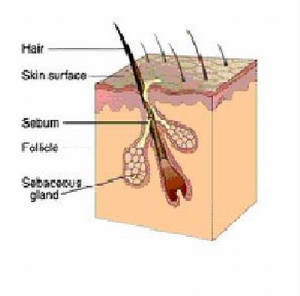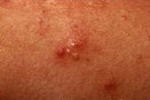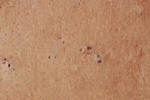|

Actual Acne pictures


|
 |
The most common form of acne is called acne vulgaris, which comprises of both whiteheads and blackheads. This form of acne
is incredibly easy to treat, as many don't know. 2.5% Benzoyl Peroxide is one of the most recommended solutions available.
Acne Rosacea
Middle aged adults often suffer from acne rosacea .This is characterized by flushing of the face and red nose caused by inflamed
bumps. This infection takes place on chin and forehead. Because of the flushing face, it gives rise to wrong perceptions of
the person being drunk, although this type of acne has absolutely nothing to do with drinking. In the severe form, Acne rosacea
causes red nose or bulbous nose (rhinofima), especially in men.
Infantile acne takes place in newborn babies, although not frequently. Sometimes it’s even present at
the time of birth. It’s a mild form of acne and settles down in a few months. The reason is supposed to be fetal hormones,
but sometimes excessive testosterone and follicle stimulating hormones are also found to be cause of infantile acne.
Acne that develops in the scalp and around the hairline is called scalp folliculitis. It is caused by increased
oil in these areas and a lack of cleaning the accumulated dirt and oil. Dryness and flakiness in the scalp is also caused
by excessive oil in the scalp. The oil and the acid produced by the scalp cause the acne to develop and make scalp flaky,
dry and itchy. Make sure to use an acne-fighting shampoo when if you have one available.
Sometimes young women suffer from perioral dermatitis. Tiny papules and pustules occur on the chin, around the
mouth and sometimes extend up to eyelids and forehead. Sometimes it is caused by the use of fluorinated toothpaste. Likewise,
use of steroids (for sports purpose) could cause corticosteroid acne.
One severe form of acne is acne conglobata. This acne affects the face, chest and back extensively. It is a
severe form of nodular cystic acne vulgaris. It is characterized by a presence of multiple inflamed and non-inflamed nodules
and scars. It is commonly found in men. Acne fulminans is a rare and very severe form of acne conglobata associated with systemic
symptoms. It nearly always affects males.
How to Prevent acne
Preventing acne breakouts is just as important as getting rid of it for the first time. This section will tell you everything
you need to know about preventing blemishes from ever coming back..the RIGHT way!
Prescription Medications For Acne
There are numerous ways to treat acne. While acne cannot be prevented nor cured, there are treatments to help lessen the severity
of the acne as well as to avoid scars and infection. When acne does not respond to over-the-counter treatments or self-esteem
suffers from the discomfort and appearance of acne, it may be time to consult a physician or a dermatologist. Only about 10%
of adult sufferers of acne consult a physician, but while acne is not curable, it is 100% treatable.
The Potential Dangers Of Prescription Medications
When acne is severe or resistant to over-the-counter treatments, a dermatologist may recommend a course of prescription medication.
What Are Pustules?
Pustules are blockages of the pores and sebaceous glands that have become inflamed.
Where On the Body Do People Get Acne?
Acne forms in areas that contain large quantities of sebaceous glands, such as the back, shoulders, neck, face, and hair.
Accutane Treatment
Accutane, the brand name for the drug Isotretinoin, is a prescription generally reserved for the most serious
cases of acne. This very powerful medication should be only considered as a last resort as there are many serious side effects
possible when taking this prescription.
Acne Cleansers - Do They Work and How Do I Maximize Benefits?
It has often been said that acne is caused by unclean skin and can therefore be remedied by extensive cleansing. However,
it has been proven that poor hygiene is not the cause of acne and that overzealous scrubbing with harsh cleansers may do your
skin more harm than good.
How is Acne Treated? (Homeopathic and Drugs)
There are numerous ways to treat acne. While acne cannot be prevented nor cured, there are treatments to help lessen the severity
of the acne as well as to avoid scars and infection.
How Should People with Acne Care for Their Skin?
There is no cure for acne, although there are numerous treatments for helping to prevent serious outbreaks. Treating your
acne and blackheads can also help improve your appearance and self esteem as well as prevent the development of lifelong-pitted
scars.
Keeping Acne to A Minimum in the Shower
Many misconceptions about skin care and acne seem logical, but are in fact farther away from the truth. Take for instance
the stance that you should scrub your face well to wash away acne, though it seems logical it is a farfetched solution and
in fact can aggravate the problem. Some people are inclined to use harsh soap to keep the body and free from infection without
realizing that it cannot prevent an outbreak of acne.
Know Your Skin
Skin is a sensitive organ and its proper upkeep is necessary to keep it healthy and protect it from infection. Skin is also
affected by inner chemical changes, which are caused because of malfunctioning of different metabolic processes in the body.
Simple acne appears on skin due to complex processes of extra male hormone formation by adrenal glands.
Let's Talk about Back Acne
To improve the condition of back acne, it is vital to understand what the root cause of this skin disease is, and also some
information about what does not cause back acne.
Natural Treatment of Acne
Acne in severe forms need medical attention, but in its mild form and at the beginning, acne can be treated effectively by
natural herbs and following natures way in our daily routine. These herbs, which help even in removing blemishes, are not
from any exotic plants or some rare species. These are very common natural products and oils found in our day to day life.
Oily Skin and Acne
People with oily skin are more prone to acne than any other type of skin. Oil glands are more commonly known as sebaceous
glands.
Teenage Acne
Three out of four teens become infected with acne and some of them may end up with severe psychological damage or physical
scarring for life. Teens may lose their self-confidence and self esteem due to the onslaught of acne. Many of them feel embarrassed
by the outbreak and tend to provide false reasons for not attending social gatherings and events.
|

